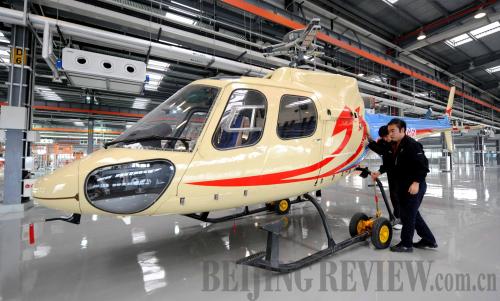|
 |
|
CHINESE CHOPPER: Engineers at the Tianjin base of AVIC Helicopter Co. move a newly produced helicopter into a testing facility. The company is expected to be able to produce more than 300 helicopters annually by 2015 (LIU HAIFENG) |
End of Auto Subsidy
The Chinese Government handed out 6.41 billion yuan ($972.9 million) in subsidies to new car buyers under the old-for-new trade-in auto program in 2010, the Ministry of Commerce (MOFCOM) said on January 5.
Sales of 459,000 vehicles were subsidized in 2010 as part of the subsidy program, which spurred 49.6 billion yuan ($7.49 billion) in sales of new autos, MOFCOM said.
The auto trade-in subsidy program was launched in July 2009 to boost new auto sales and help cut emissions.
The old-for-new auto subsidy program and the promotion of auto sales in rural areas came to an end on December 31, 2010.
Anti-monopolistic Rules
China's competition law enforcement authorities published new regulations to crack down on anticompetitive, monopolistic-type behavior on January 4.
The regulations against monopolistic-pricing will take effect on February 1, said the National Development and Reform Commission (NDRC).
The regulations apply to cases of price monopolies both inside and outside China, when monopoly prices outside the country impact the domestic market, according to the NDRC.
China implemented its first anti-monopoly law on August 1, 2008.
IPR Protection
China will take further action to boost intellectual property rights (IPR) protection and improve its investment environment to shore up cooperation with the EU, said Xu Xianping, Vice Chairman of the National Development and Reform Commission.
Stressing that mutual understanding and reciprocal industrial and investment cooperation are crucial for China-EU ties, Xu said China seeks to step up cooperation by creating more favorable conditions to reinvigorate their economies as well as upgrade and transform their industries.
Futures Contracts
The number of futures contracts traded on Chinese exchanges rose 45.22 percent in 2010 compared with 2009, according to the China Futures Association (CFA).
The volume of contracts traded on China's futures markets reached 3.13 billion contracts in 2010, said the CFA.
Futures contracts in China are traded on the Shanghai Futures Exchange, the Dalian Commodity Exchange, the Zhengzhou Commodity Exchange and the China Financial Futures Exchange.
Forestry Output
The output value of forestry rose 27 percent in 2010 to more than 2 trillion yuan ($302 billion), a senior forestry official said on January 5.
China produced the most rosin, fabricated boards, bamboo and rattan wood furniture, and timber floor products of any country in 2010, said Jia Zhibang, Administrator of the State Forestry Administration (SFA).
The SFA will reform some state-owned tree farms this year to boost forestry product output.
At the end of 2010, there were 4,507 state-owned tree farms with a total area of 62 million hectares nationwide.
Jia said China aims to produce 2.4 trillion yuan ($362.3 billion) of forestry products in 2011.
Vestas' China Order
Danish wind turbine maker Vestas said its orders from China in 2010 reached a record high as the country invested more heavily in clean energy, including wind power.
"In 2010, Vestas announced almost 1,000 megawatts worth of orders in China alone, which is a record high order intake for Vestas in this competitive market," Vestas Wind Systems said.
The company's largest integrated manufacturing plant is in China's coastal city of Tianjin.
China became the world's biggest wind turbine market in 2009 when energy infrastructure markets in the West were lagging. | 